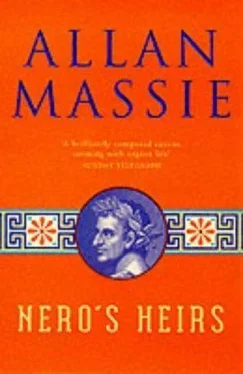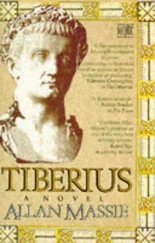Allan Massie - Nero_s Heirs
Здесь есть возможность читать онлайн «Allan Massie - Nero_s Heirs» весь текст электронной книги совершенно бесплатно (целиком полную версию без сокращений). В некоторых случаях можно слушать аудио, скачать через торрент в формате fb2 и присутствует краткое содержание. Жанр: Исторические приключения, на английском языке. Описание произведения, (предисловие) а так же отзывы посетителей доступны на портале библиотеки ЛибКат.
- Название:Nero_s Heirs
- Автор:
- Жанр:
- Год:неизвестен
- ISBN:нет данных
- Рейтинг книги:3 / 5. Голосов: 1
-
Избранное:Добавить в избранное
- Отзывы:
-
Ваша оценка:
- 60
- 1
- 2
- 3
- 4
- 5
Nero_s Heirs: краткое содержание, описание и аннотация
Предлагаем к чтению аннотацию, описание, краткое содержание или предисловие (зависит от того, что написал сам автор книги «Nero_s Heirs»). Если вы не нашли необходимую информацию о книге — напишите в комментариях, мы постараемся отыскать её.
Nero_s Heirs — читать онлайн бесплатно полную книгу (весь текст) целиком
Ниже представлен текст книги, разбитый по страницам. Система сохранения места последней прочитанной страницы, позволяет с удобством читать онлайн бесплатно книгу «Nero_s Heirs», без необходимости каждый раз заново искать на чём Вы остановились. Поставьте закладку, и сможете в любой момент перейти на страницу, на которой закончили чтение.
Интервал:
Закладка:
Yet their efforts were random and they were easily avoided. A great city has ever its night-hawks – criminals, debauchees, waifs, lunatics, poets (I daresay) and unhappy wretches such as myself to whom sleep denies her gentle comforts. So I wandered the streets and knew many strange encounters: quick couplings against the slimy walls of noisome alleys, rambling conversation by the braziers along the river bank where broken men and women congregated. Sometimes I found myself in sinister cellars, drinking-dens, the lowest sort of brothels, gambling-houses.
I remember one night falling in with a young man of noble birth, as evinced by his negligent dress and manner of speaking. He was only, I judged, a little drunk, but his conversation was wayward. He insisted that I accompany him to a place that he knew, where, he said, we could gamble and drink and lie with women. 'Or boys or what you will. There are Africans there,' he said, 'and my fancy is for dark flesh.' The place was mean and sordid, lit by tallow candles, and managed by a toothless crone, who laughed to see us. I heard malice in that laugh, but by the light, such as it was, I saw something in my companion which appealed to me. It may have been the soft disappointed line of his mouth or the long lashes that flickered over his deep-set eyes. I do not remember, though I remember these features. They made a gull of him there, throwing loaded dice to win the gold which, if he had not lost it, they would have stolen. I felt a savage joy as I watched his humiliation and saw him grow incoherent on the sour wine of the house. The debonair manner which had attracted me because I knew it to be assumed as a mask for the despair which consumed him, disintegrated. He wept, and then implored the woman to furnish him with a black girl, as she had done before. 'You have no gold,' she said, and the ruffians who had fleeced him, took hold of him and hurled him out into the black night. I found him in the gutter, helped him up, and then, when he shook me off with assurances that he was all right, watched him stagger out of my life.
Why does that memory stay with me? Not because I behaved badly, for I have done worse in my time. Because of the gallantry with which he accepted his humiliation? Perhaps – 'and dying he remembers his sweet Argos'. Wasn't that the condition of Rome?
XXXI
You write, Tacitus, yet again chiding me for my delay in sending you further instalments of what you call my 'copy' and, then, as an afterthought, ask me if I have been ill, since you can't understand, or imagine, why otherwise I should be failing you. As you have never once, since I embarked – unwillingly, I remind you – on this exercise which has aroused in me so many painful memories I had thought well buried, expressed a word of gratitude, you might consider that this omission of courtesy would be sufficient reason for me to desist. But then, you know me. You know I am not dependent on your gratitude, and care little for expressions of appreciation. So you are justified in supposing I may have been ill.
But not in body. My illness is of the spirit, or the will, or whatever you choose to call it. The truth is that your request from the first reminded me of the wisdom of Herodotus' line: 'you stir what should not be stirred.' History is a record of crimes and foolishness, and no more that I can see. It has no instructional value, for each generation of men is confident of its own wisdom and ability to avoid its fathers' mistakes. Nor can I agree with Aeschylus that 'lamentations are a sure relief of sufferings.' Or it may be that I have not the gift to give tongue to lamentations. I do not know. I know only that I have been wretched to trawl over past horrors.
And now I must approach the moment when Vitellius prepared to enter Rome. 'Ill-gotten gains work evil' in Sophocles' words.
You will be growing impatient again with my procrastinating literariness. Too bad.
Rumour had warned us that his army was ill-disciplined. In particular there were frequent dissensions between the legionaries and the auxiliary troops, each believing the other more favoured by their indulgent commander. They united only to loot the villages and towns through which they passed and to abuse, rape and sometimes murder, their inhabitants.
Nevertheless when word came that the new Emperor was within a few miles of Rome a throng, mostly of the baser sort, but including some Senators and equestrians eager to be among the first to welcome their master, tumbled out to meet him. They ran wild through the army and the camp, and so great was the confusion that many of the soldiers believed themselves to be insulted. They drew their swords and fell upon the people, killing upwards of a hundred. It was with difficulty that some semblance of order was restored, and then they were in the city, still armed, contrary to all law and custom. The sight of some of the auxiliaries, bristling with the skins of wild beasts, and armed with lances, terrified the citizens; and these troops themselves, many of whom were overawed by the size of the buildings, reacted brutally to the citizens' alarm. It was with difficulty that the tribunes and prefects prevented a general massacre from taking place. What a start to a new reign!
Vitellius, it was reported, crossed the Milvian bridge on a big black horse. He was in a state of intense excitement, his face shining purple and his eyes darting about. It was a moment of glory he could never have expected. He wore a military cloak and brandished a sword. But someone of sense – I never learned who, and am indeed only surprised that such a man was to be found among the members of his staff – must have told him that it would never do to enter Rome in the guise of a conquerer. So he halted and, retiring into a convenient house, assumed civilian dress.
So he was on foot when I caught sight of him, and it must be admitted he looked better on horseback. This was partly because he had a heavy limp, the consequence of a chariot crash in his youth – Caligula was driving at the time. In an attempt to disguise it he was now leaning on the shoulder of one of his officers; and this detracted from his dignity. He was very tall, and might have made an imposing figure but for his huge paunch, the result of his gluttony and drunkenness. As it was, he looked grotesque, for everything about him was exaggerated. 'They say he's got a dong the length of an Egyptian obelisk,' a bystander in a butcher's apron muttered.
This was the creature who now marched – unsteadily – at the head of his army, Emperor of Rome.
The eagles of four legions were in the van and on either side the colours of other legions were carried. Then came the standards of twelve auxiliary squadrons of cavalry, and the cavalry themselves behind the legions. More than thirty auxiliary cohorts followed, each bearing the name or equipment of the nation from which it was drawn. The line of march was flanked by the prefects, tribunes, centurions, and the other officers.
It was a splendid sight – if the city they were entering had not been Rome, but some barbarian capital they had stormed. Even with that reflection, many thrilled at this evidence of the might and majesty of Rome, and only a few commented that it was an army worthy of a better Emperor than Vitellius.
For my part, I was fully occupied in calming Domitian's apprehension. The strength of the enemy forces threatened to unman him. 'How can we hope to overcome such an army?' he muttered.
I assured him that if he had seen the splendour of his father's legions, he would not lose heart so easily. This was true but unhelpful. He did not care to be reminded that I knew more than he did of Vespasian's readiness for war.
The next day Vitellius appeared at the rostra and delivered a eulogy of himself. It was as if he was recommending his virtues to the Senate and people of a conquered state. He spoke of his energy and moderation, though his progress to the city had been marked by sloth, self-indulgence and cruelty.
Читать дальшеИнтервал:
Закладка:
Похожие книги на «Nero_s Heirs»
Представляем Вашему вниманию похожие книги на «Nero_s Heirs» списком для выбора. Мы отобрали схожую по названию и смыслу литературу в надежде предоставить читателям больше вариантов отыскать новые, интересные, ещё непрочитанные произведения.
Обсуждение, отзывы о книге «Nero_s Heirs» и просто собственные мнения читателей. Оставьте ваши комментарии, напишите, что Вы думаете о произведении, его смысле или главных героях. Укажите что конкретно понравилось, а что нет, и почему Вы так считаете.












